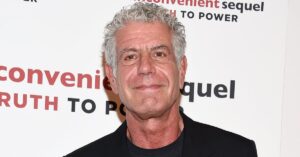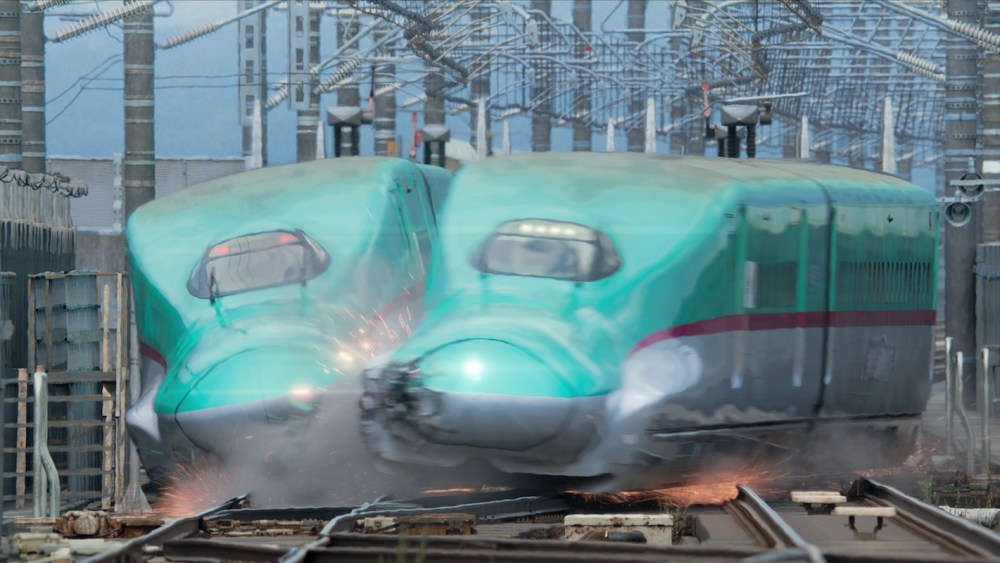Even at their most fantastical, high-concept blockbusters can prompt audiences to contemplate what might happen if their circumstances took place in real life. Frequently, the question is as simple as what would “actually” happen or how an individual would react if presented with a larger-than-life situation. But after watching local, national or even worldwide forces respond to an emergency or incident, it becomes easy — even natural — to compare that effort to what the characters in a movie do when they leap into action.
In that regard, “Bullet Train Explosion” meets a believability threshold that feels virtually unparalleled. Like his previous film “Shin Godzilla,” director Shinji Higuchi’s follow-up to the 1975 Japanese film “The Bullet Train” explores with meticulous and realistic detail what a bureaucratic response might be to, well, a scenario that’s likely only to happen in the movies. Even without a movie star fighting his way up and down the trail (à la “Bullet Train” or “Kill”), Higuchi ensures that this scenario is no less exciting, relying on quieter but no less affecting acts of heroism as well as an escalating series of set-pieces that will thrill audiences until the last story beat has reached the end of the line.
Following an opening credits sequence that plays like a sizzle reel for the film, “Bullet Train Explosion” begins in a station where the Hayabusa No. 60 train is bound for Tokyo. Despite the impulse to romanticize his job as conductor, Kazuya Takaichi (Tsuyoshi Kusanagi) frets over his waning relevance to school-age riders more interested in their classmates and mobile devices than the class and nobility of high-speed railway travel. Takaichi’s young protégé Keiji Fujii (Kanata Hosoda) is eager to follow in his footsteps, but is more easily distracted by passengers like Mitsuru Todoroki (Jun Kaname), an entrepreneur and social media star, and Yuko Kagami (Machiko Ono), a politician who’s trying to bounce back after a scandal.
Soon after the train’s departure, the office of Japan Railway commander Yuichi Kasagi (Takumi Saitoh) receives a notification from a mysterious caller claiming that a bomb has been planted on the Hayabusa No. 60, and it will detonate if the train decelerates below 100 km/hour, which is less than half the conveyance’s typical speed. Kasagi corrals his team and races into action, enlisting Takaichi and the train crew to keep the passengers calm and, if possible, coordinate a rescue effort. But when the perpetrator announces their plan on social media and asks for a ransom of 100 billion yen in order to prevent detonating the bomb, not only do government officials get involved but so do the Hayabusa’s passengers, working together to find a resolution that doesn’t end in widespread death and destruction.
As much as all of the films in the “Godzilla” franchise focus on humankind’s plan to deter the eponymous creature from laying Japan to waste, “Shin Godzilla” fixated on local and national emergency infrastructure in a way that made it feel uniquely tactile and realistic (even with a Godzilla who sometimes had googly eyes). “Bullet Train Explosion,” despite its almost comical title, takes the same approach with a premise that is conceptually more plausible and turns it into a convincing if slightly idealistic portrait of personal, corporate and legislative efforts working with one another in lockstep.
As played by Tsuyoshi Kusanagi, Takaichi is the ideal protagonist for Shinji Higuchi’s treatment of this sensationalistic idea: He’s proficient and level-headed, and his classical notions of professionalism and even-tempered humanity become a linchpin in the ongoing response to the crisis. The rest of the characterizations follow his lead, and the script by Kazuhiro Nakagawa and Norichika Ōba takes every character seriously — offering them a tremendous amount of dignity and grace whether or not they deserve it. Those individual details further become an over-arching theme as the story progresses, highlighting a deeper truth that no one, no matter their actions, is irredeemable, possibly even if they’re the person who planted a bomb on the train.
If the premise sounds a lot like “Speed,” that’s because its predecessor was one of the inspirations for Jan de Bont’s 1994 film. Featuring Ken Takakura and Sonny Chiba, Junya Sato’s “Bullet Train” is at best moderately well-known outside of Japanese genre cinephiles (it’s only been released a handful of times on limited edition physical media). In the course of connecting the two films, “Explosion” offers a brief “archival footage” recap using clips of the original, but the cinematic legacy to which it more firmly belongs is less Junya’s thriller or even “Speed” than a film like “Apollo 13,” where good, dedicated, hard-working people put their heads together to solve a problem with a combination of team cooperation and scrappy ingenuity. Whenever a new character disrupts the measured and methodical process of addressing the runaway train — be it an initially smug government official or a disgraced pilot who gets identified among the train’s passengers — they actually break the movie’s spell.
Even so, the movie leans on the rules of modern-day “legacy sequels” where the sins of one generation trickle down to the next, and ultimately arrives at a plan, and motivation, for the bomber that doesn’t quite make total sense. But the filmmaking is clean and elegant, chronicling each new wrinkle with a pacing and geographical clarity that maintains real tension. Higuchi reportedly had access to real trains and equipment to stage many of his scenes — a type of cooperation that speaks to the sensitivity of its fictionalized treatment of train personnel and governmental operations — and the audience feels a consistent sense of urgency and physical reality as the train races at breakneck speeds through a station bustling with pedestrians or narrowly avoids a devastating collision.
For multiple generations of audiences weaned on the first film’s downstream successors, Higuchi’s follow-up may prove too straightforward or classy to elicit the same excitement. But “Bullet Train Explosion” feels like a blockbuster made for adults — or let’s say, not for a lowest-common-denominator audience — where the priority is throwing challenges and complications at smart characters instead of sparking conflict with cheap narrative shortcuts and bad, even dumb choices. Of course, the idea that a bureaucracy can function as effectively as Japan’s does here is for many an idea even more fantastical than an alien invasion or superhero showdown. But in emphasizing intelligence, cooperation and semi-grounded reality, Higuchi underscores the fact that even when otherwise adhering to conventional blockbuster wisdom, there are some beliefs it’s not necessary for filmmakers to suspend.
Read the full article here








